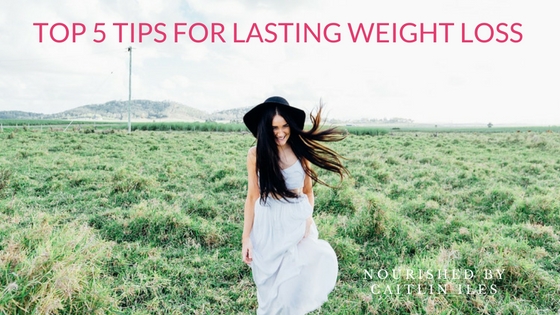Hi friend! Today I’m taking on the main reason most people come to the health and fitness world: weight loss. I’m a firm believer that sustainable weight loss is a by-product of actual health, which requires more than just the militaristic monitoring of our calorie intake and expenditure.
Calories do matter. I mean you can’t just eat 5000 calories a day and think you’re going to be a healthy weight (unless you’re some sort of elite athlete, which is not really my target audience. Though if you’re here and you are, welcome!).
So while calories do matter, what matters most is that the food that you eat eat sends very important signals and information to your body, your cells, and your hormones. 200 calories worth of M & Ms is going to send a very different signal to your body than 200 calories of broccoli and chicken.
There are lots of wonderful resources out there that go into great detail about the epigenetic effect of food and I highly recommend you read some, but today I’m just going to give some broad strokes on the foods and activities that send positive messages to your cells and so support a healthy body and a healthy weight.
Note: There is a big difference between what a healthy weight for your body may be and what our culture promotes as a “healthy weight.” A healthy weight means that you have the physiological health markers to go along with it. I.E. hormone balance, healthy insulin secretion and uptake, low visceral fat around your midsection & organs, and the ability to use your body without pain, fatigue, or injury.
This might mean you still carry some subcutaneous fat in various areas of your body and so don’t look like the typical “model of health” you have shoved down your throat through fitspiration and other media. But trying to force and fight your body into that mold if that’s not your natural body composition can do more harm than good. We’re not all hourglass shapes with 24-inch waists and that’s not a bad thing.
Eat Healthy Fat
Ding dong the witch is dead. Conventional health recommendations are finally realizing that fat is not the enemy. Yes there are fats that you should avoid such as trans fats, refined vegetable oils, and anything rancid, but a healthy body needs adequate healthy fat in the diet not only to improve satiety (meaning you feel fuller, so you eat less. Wahoo!), but also to maintain brain function, build properly permeable cell structures, and give you a dewy glow.
So fill up on healthy fats from avocados, butter, ghee, olives, coconuts, and a moderate amount of nuts and seeds. Check out this handy guide for the best sources of healthy fats and how to use them.
Consume Adequate Protein
Protein is essential for making you feel full and for helping you build muscle, hormones, neurotransmitters, and many other important tissues in youy body. Make sure that every meal and snack contains some form of protein to help keep your blood sugar balanced.
I personally do really well on protein from animal sources, but you may do best on a combination of legumes some low-allergenic grains, nuts and seeds.
Make sure any meat you consume is grass-fed, pastured, organic, and/or ethically raised so that your consumption helps support sustainability and compassion as opposed to reckless destruction and cruelty. Same goes for fish. Avoid anything farmed and always look for the sustainable label on your purchase.
Avoid Excessive Carbohydrate Consumption
Most people need carbs. Some people do very well on very little carbs. Some people, women in particular, may sacrifice their reproductive health if they go too low carb. The important thing to take into consideration when consuming carbohydrates is to ensure that they come from whole food sources.
Just because millet flour doesn’t have gluten doesn’t mean you can eat millet pancakes with wild abandon and not gain weight. At least I can’t 🙁 Eat carbs in their whole forms or as close to as possible. This means filling up on fruits and veggies and small amounts of natural sweeteners such as maple syrup, honey, coconut palm sugar or sap, rice syrup, or molasses.
Avoid agave as this supposed health food is actually a highly processed product that contains more fructose than high fructose corn syrup. Fructose in excess not only gets stored as fat but can also be a contributing factor in the development of non-alcoholic fatty liver disease. That is not sexy!
Don’t Drink Your Calories
Do you want to know where a lot of tricksy refined carbohydrates are hiding? In the things that you drink! Now I’m not talking about adding a tsp. of honey to your tea occasionally or drinking highly fermented kombucha. I’m talking about sodas, fruit juices from the grocery store, iced teas, frappes, lattes, smoothies from supposed “health” chains, amongst a myriad of other sugary bevvies. While some of these things may masquerade as healthier alternatives to soda, many of them contain just as much if not more sugar than your average can of pop.
I’m not going to get into the dyes and preservatives most of these drinks contain today, though you definitely want to avoid those as well. What’s important to note with your drinks is that when you are consuming super sweet beverages they are often lacking the necessary fibre, protein, and fat needed to slow the rate at which the sugar leaves our stomachs and enters our bloodstreams.
The faster this happens, the more insulin you need to produce, the more likely you are to become desensitized to insulin, and the more fat you’ll end up storing. This progression can set you up for all manner of illnesses from type 2 diabetes to heart disease.
If you currently consumer a sh*t load of sugary drinks try slowly swapping them out for infused waters (lemon, mint, orange, cucumber, berries… get creative!), herbal teas, naturally fermented low-sugar drinks, or fizzy water.
Identify and Avoid Allergenic Foods
Even if you’re eating all the right things, such as clean protein sources, healthy fats, and whole-foods carbs, if you’re still eating something to which you’re allergic it is going to cause weight gain, likely via inflammation and water weight. While in extreme circumstances food allergies lead to weight loss, it is a by-product of villous atrophy and your body not absorbing the foods that you eat. So that weight loss is definitely not classified as healthy. Some common allergenic foods include, but are not limited to:
- Gluten and other proteins found in grains
- Corn
- Soy
- Dairy
- Nuts
- Strawberries
- Sesame
- Eggs
If you’re following the above recommendations and still not seeing any success it would be worth testing out an elimination diet. Make sure you are supervised by a qualified healthcare practitioner (like me!) when undertaking this endeavour.
Whew! That was a big one today friend. But if you start incorporating these simple little steps into your daily routine you may very well start seeing some noticeable results in how you look and feel. My advice is to start where you need the most work and go from there if you want to see the biggest changes in the least amount of time.
If you’re struggling with your weight-loss or healthy living endeavours, make sure you download my FREE Stop Self-Sabotage Workbook by clicking here. It will help kick start your changes and give you loads of support!
Cait xo
Photo Credit: Shutterstock





Trackbacks/Pingbacks